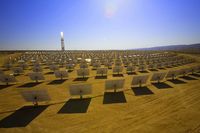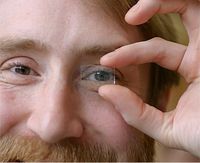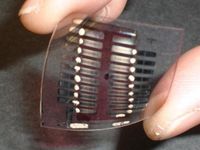
As a result, financing games like that of 1 Block off the Grid get big write-ups.
But that's now how it's going to go.
There are a host of “small solar” technologies, using plastic, and printing techniques, in the process of coming out of labs, all seeking funding. We don't pay much attention to it because the industry on which it's based, flexible electronics, is itself brand new.
But this is the real revolution of our time. This is the computer chip of the early 21st century. It's where Always-On meets the power industry.
I've been writing about what I call Always-On, what others have dubbed “the Internet of Things,” since 2003. The idea is that remote sensors and motes, single-chip devices with built-in wireless communications, could live on us, and among us, tracking what we have and our condition.
I underestimated.

This idea of printing-and-sticking power onto what already exists is easily expanded. The number of things no longer connected to the grid, or to battery technology, starts growing exponentially. And it keeps growing.
Instead of having panels on your house, in five years you'll buy something more like wallpaper, something that covers your walls and delivers power where it's needed. Street lights will no longer be connected to the electric grid, but to the information grid, and that can be a wired or wireless connection.
I have long felt that today's electric utilities are similar to the phone utilities of the early 1970s. They didn't know their business was changing, either. They didn't see the Internet coming. They had no idea that their whole business model was becoming obsolete.

As with computing, this is going to happen quite suddenly. We're in the “plug-compatible” point of the evolution right now. Standards are going to bring us into the “mini-computer” part of the curve quite quickly, but the equivalent of a microchip evolution is right around the corner, and when that gets productized, anywhere from 3-5 years from now, watch out.
Electronics and power built into everything you buy, everything you touch, with the grid used mainly for balancing the load, buying as well as selling power from homes and offices, that future is a lot closer than anyone suspects.
And with it will come a new kind of prosperity. I just didn't realize until today how fast that world is coming. Now just within my kids' lifetimes, but within my own.










That thing is pretty impressive. Solar panels is really a big saving to each of us.
That thing is pretty impressive. Solar panels is really a big saving to each of us.
That’s again one of the newest invention of the world. Small solar and the changing grid will surely make a news and I think we will all get proud of you. I believe that small things can make a change.
That’s again one of the newest invention of the world. Small solar and the changing grid will surely make a news and I think we will all get proud of you. I believe that small things can make a change.
Adonis Sturdevant
I cannot thank you enough for the blog.Really thank you! Awesome.
I haven’t seen that device yet. It’s definitely a great invention. It would help in a lot of ways.
I haven’t seen that device yet. It’s definitely a great invention. It would help in a lot of ways.